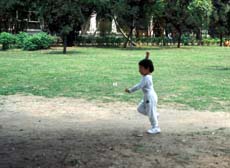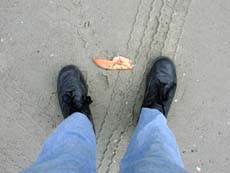About inhabiting the moment
It is not just stone or wood that we experience, but stone supporting or wood shaping and bracing, and there is no easy line to be drawn between these actions and the goals and actions of the economic and cultural and political processes within which the stone and wood play. Don't turn completely away from that life to encounter just the stone -- for that is, in Hegel's sense, an abstraction -- but rather find a fuller way to be in places, a way in which their processes and social norms can be lived with a light touch that lets the stone be with us in its full suchness. Hegelian Zen? This is a contemporary form of the age-old spiritual problem of uniting, in Christian terms, contemplation and action, or, in Buddhist terms, wisdom and compassion. Complexity and encounter have to be related.
We should be wary of that tradition influenced by Heidegger, which urges a break with the current technological culture and a return to primal contacts. Inspired by Hegel, I believe that our problems stem more from half-done than from too much reflection, that reflection need not be distancing, and that we should work through our complexities rather than step behind them. This can bring us to encounter even more concretely our mortality and the world's materiality.
The issue keeps coming back to how the moment and the present and the place exist, and I keep arguing that these are what they are because they open up to their horizons and linkages. We exist in the spacious process of their happening.- [Return to "native spaciousness"]
- [Continue on the objections path]
- [Nearby: Objections and replies -- About awareness of context and links -- About complexity ]


